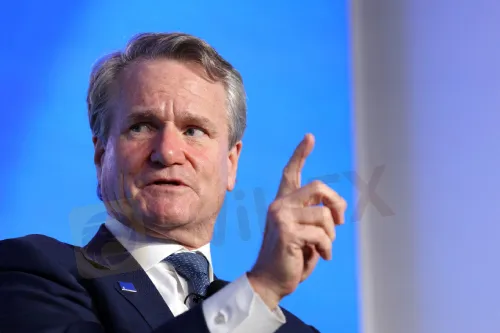Major U.S. Banks Plan Stablecoin Launch Amid Crypto Regulations
Abstract:Major U.S. banks like Bank of America and Citibank explore stablecoins as new crypto-friendly bills set to reshape digital assets' role in finance.

Top American banks like Bank of America (BofA) and Citibank are advancing plans to introduce their own stablecoins, marking a pivotal moment for digital currencys potential role in mainstream finance. Stablecoins, digital tokens designed to maintain a steady value—usually pegged to a currency like the U.S. dollar—are at the center of these efforts as financial institutions anticipate new, more accommodating regulations for cryptocurrencies.
Bank Leaders Chart the Stablecoin Path
BofA‘s CEO, Brian Moynihan, recently confirmed that the institution is actively developing its own stablecoin. While Moynihan stopped short of outlining a launch date, he assured stakeholders of the bank’s ongoing commitment to this initiative. Noting that current client interest in stablecoins remains modest, Moynihan emphasized that BofA is carefully gauging market needs before moving ahead. The banks measured approach reflects an intent to understand how stablecoins might fit within existing financial realities rather than simply racing to market.

Stablecoins are already widely used in the crypto market, especially by traders shifting assets between tokens. Their promise lies in bridging the gap between conventional banking and the rapidly changing world of digital assets, thanks to their stability when compared to more volatile cryptocurrencies like Bitcoin.
Regulatory Uncertainty Shapes Bank Strategy
Progress on crypto regulations in the U.S. has proved slower than many anticipated, held back in part by ongoing ambiguity around legal guidelines. This lack of clear rules has prompted banks to act with caution. Citibank, for instance, is considering launching its own stablecoin—CEO Jane Fraser described the potential as a “good opportunity” to enhance the banks digital payments capabilities. Nevertheless, Fraser and her peers across the industry are closely monitoring both market demand and regulatory developments before formally entering the space.
Citibank and BofA arent the only major players drawn to the stablecoin sector. Morgan Stanley and JPMorgan Chase are both closely watching developments, with JPMorgan CEO Jamie Dimon voicing skepticism but acknowledging the growing institutional interest. Their engagement signals a wider shift among Wall Street giants, with stablecoin adoption now viewed as a potential cornerstone for the next phase of banking innovation.
Congress Pushes for Stablecoin Legislation
Momentum is building in Congress for the passage of a crypto-focused regulatory bill, the GENIUS Act, designed to establish ground rules for stablecoin issuance and oversight. Proponents argue this legislation could legitimize stablecoins and clear the way for further integration of digital assets throughout the financial sector. The bill stipulates, among other requirements, that stablecoins must be backed by secure, liquid assets to protect holders and the broader system.
With political and regulatory winds shifting in their favor, American banks are preparing for a profound transformation. As stablecoins gain recognition and legitimacy, their role as a foundation for future digital payment infrastructure is becoming more apparent. The speed and breadth of stablecoin adoption will likely hinge on forthcoming rules, with the financial industry positioning itself to capitalize on the next wave of digital innovation.
In summary, as Bank of America, Citibank, and others gear up to launch their own stablecoins, they are steering the industry into a new era—one where digital assets are poised to fundamentally change the way financial services operate in the United States. The emergence of clear regulations may soon unlock this next chapter, with stablecoins ready to take center stage.

Read more

XM Launches Unlimited Cashback Promotion for Traders Worldwide
XM launches unlimited trading cashback from July 15 to August 15. Get unlimited rebates with a Standard or Micro account and enjoy expanded trader club benefits.

CME International Records a Massive Jump in Forex Volumes
CME International recorded a record surge in its foreign exchange trading volumes during the second quarter. Check out its performance across products and markets.

IMF Warns of Global Risks as US Slaps 50% Tariffs on Import
The IMF warns of rising global uncertainty after the US imposes a 50% tariff on copper and Brazil imports. Factories worldwide brace for economic fallout.

FCA’s Tech Crackdown Suspends 1,600+ Financial Sites
The FCA’s 2024 report details a tech-driven crackdown on financial crime, suspending 1,600+ sites and increasing firm authorisation cancellations in the UK.
WikiFX Broker
Latest News
PrimeXBT Launches MT5 PRO Account for Active Traders
eToro Expands into Singapore with MAS CMS Licence
Renault shares plunge 16% after French carmaker lowers guidance, appoints new interim CEO
Darwinex Launches INDX: A Revolutionary Investment Strategy for Traders
Top Forex Trading Scams to Watch Out for in 2025
Real Risk Factors with Admiral Markets ! Explained
5 Reasons to Know Why INFINOX Is a Standout Broker?
5 things to know before the stock market opens Wednesday
Trump's big beautiful bill' caps student loans. Here's what it means for borrowers
Weekly mortgage demand plummets 10%, as rates and economic concerns rise
Rate Calc
